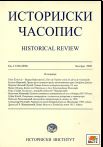Србија и Друга конференција мира у Хагу 1907. године
Serbia and the Second Hague Peace Conference, 1907
Author(s): Nenad MilenovićSubject(s): History
Published by: Istorijski institut, Beograd
Keywords: Serbia; the First and Second Hague Peace Conferences; the Attitude of Government; Public Opinion; the Limitation of Armaments; International Arbitration; Pacifism; Foreign Affairs
Summary/Abstract: The participation of Serbia at the Hague Peace Conference in 1907 is important as an example of the small nation’s perception of the movement for arbitration, limitation of armaments and further development of international community. It is an illustration of methods through which a small state endeavored to ideologically accommodate itself within a discourse of universal values of peace, justice and humanity, without impairing its vital interests and damaging its relations with the great powers. The contribution of Serbia to the proceedings of the Second Peace Conference was greater and more recognized and appreciated than the role Serbia had played at The Hague in 1899. Its delegation included crafty statesmen, seasoned diplomats and experts excelled in international law. It was the first time in its history that a statesman from Serbia attracted such attention and attained vice-presidency of a committee at the international congress of immense value and importance. The fundamental nature of conventions and declarations adopted in 1907 were in harmony with the premises of Serbian foreign policy, national interests and official position taken at the Dutch capital. Serbian delegation realistically assessed the importance, value and scope of ideas, questions and problems dealt with, but also the ability of the conference to provide the framework for implementation of the potential solutions. Serbia presented itself as a state prepared to identify its own interests with the interests of other small nations; as a state able to perceive the magnitude and substance of the principles of international law and community; and, finally, as a state capable to find the proper measure between fulfilling its own interests and complying to common values. But, the Serbian policy was, also, in accordance with prevailing contemporary notion of primacy of national interests over the interests of international community, dominant in Europe and the World at the threshold of the 19th and 20th century. After a decade and a half during which she was perceived as the politically and financially unstable Balkan country, and often designated as the realm of king slayers and plotters (after 1903), Serbia managed to change a bit this almost established and dangerously widespread image in European public opinion through participation at the Second Hague peace conference in 1907.
Journal: Историјски часопис
- Issue Year: 2008
- Issue No: 57
- Page Range: 375-412
- Page Count: 38
- Language: Serbian

